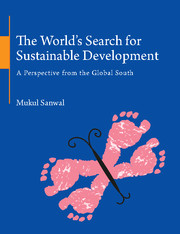Book contents
- Frontmatter
- Dedication
- Contents
- Preface
- Acknowledgments
- Abbreviations
- INTRODUCTION
- 1 Social Dimension of Sustainability
- CONSUMPTION IN AN UNEQUAL WORLD: FRAMING INTERNATIONAL COOPERATION
- CLIMATE POLICY: GLOBAL TO NATIONAL
- SUSTAINABLE DEVELOPMENT: NATIONAL TO GLOBAL
- CONSUMPTION IN A MORE EQUAL WORLD: SHAPING SOCIETAL FUNCTIONS
- 17 Geoeconomics of Human Well-being
- 18 Social Science – Policy – Society Interface
- 19 Reframing the ‘Common Concern’ From a Physical to a Social Problem
- 20 Developing a Shared Global Vision
- GEOPOLITICS TO GEOECONOMICS: RURAL–URBAN DIVIDE, RATHER THAN BETWEEN COUNTRIES
- THE ASIAN CENTURY
- Index
17 - Geoeconomics of Human Well-being
from CONSUMPTION IN A MORE EQUAL WORLD: SHAPING SOCIETAL FUNCTIONS
Published online by Cambridge University Press: 18 December 2015
- Frontmatter
- Dedication
- Contents
- Preface
- Acknowledgments
- Abbreviations
- INTRODUCTION
- 1 Social Dimension of Sustainability
- CONSUMPTION IN AN UNEQUAL WORLD: FRAMING INTERNATIONAL COOPERATION
- CLIMATE POLICY: GLOBAL TO NATIONAL
- SUSTAINABLE DEVELOPMENT: NATIONAL TO GLOBAL
- CONSUMPTION IN A MORE EQUAL WORLD: SHAPING SOCIETAL FUNCTIONS
- 17 Geoeconomics of Human Well-being
- 18 Social Science – Policy – Society Interface
- 19 Reframing the ‘Common Concern’ From a Physical to a Social Problem
- 20 Developing a Shared Global Vision
- GEOPOLITICS TO GEOECONOMICS: RURAL–URBAN DIVIDE, RATHER THAN BETWEEN COUNTRIES
- THE ASIAN CENTURY
- Index
Summary
Global consumption drives exhaustion of natural resources and environmental systems, and this is primarily the impact of the expanding urban middle class. The drivers represent increased needs for mobility rather than increased population, diet based on livestock farming which has the highest global anthropogenic impact on land use and community and social norms in the way electricity is used in buildings.
Urban Design
Urban planning shapes travel distances between people and places they need to go to work, school, shopping and recreation. A focus on increased population densities and on accessibility; mixed use areas rather than only establishing more roads to enable speedier movement of goods and services reduces natural resource use. The current ‘zoned’ cities make inefficient use of infrastructure and do not support a modal shift to public transport, which needs greater efficiency and acceptability as well as a reduced need to travel. ‘Streets’ serve many purposes other than as transport arteries, as they also encourage non-motorized mobility.
With respect to personal transport, it is now being accepted that technical solutions alone will not lead to a reduction in emissions of greenhouse gases (GHGs) in the transport sector, and demand-side management, including modal shifts will be an essential part of the strategy, and can also be cost effective. Accessibility does not depend so much on affordability of the transport network as on the quality and efficiency of reaching places. This perspective will serve to change public attitudes to personal mobility and the automobile. The reframing extends to considerations of shifting the focus of policy away from redefining needs – not just reaching destinations but also accessing opportunities, making a distinction between transportation, or motorization, and trips and travel distances, or mobility. The key issue in shaping transport patterns is urban design.
Transport volume growth responds to economic development in the sectors using transport. Economic growth leads to a demand for more transport; growth means more goods to be produced and traded, and wealth leads to more services consumed. For example, in the European Union, transport GHG emissions have risen 27 per cent between 1990 and 2007, total transport energy consumption increased by over one-third, and in 2009, transport contributed one-quarter to GHG emissions from all sectors in the European Union. Road transport represents the largest energy consumer, accounting for three-quarters of total demand.
- Type
- Chapter
- Information
- The World's Search for Sustainable DevelopmentA Perspective from the Global South, pp. 219 - 222Publisher: Cambridge University PressPrint publication year: 2015

